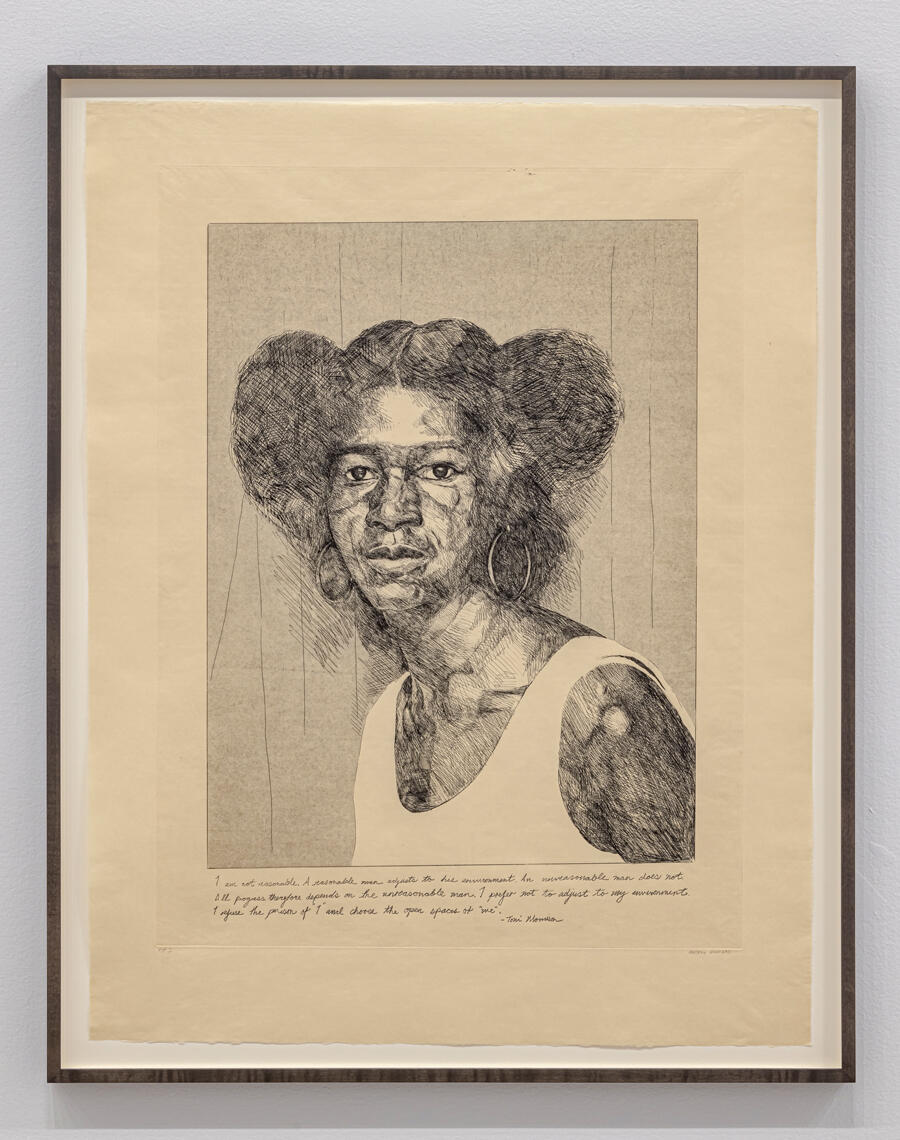Meleko Mokgosi Challenges Tropes of Mastery
At Art Gallery of York University, Toronto, the multi-panel paintings and prints confront notions of subjecthood through theories of the subconscious
At Art Gallery of York University, Toronto, the multi-panel paintings and prints confront notions of subjecthood through theories of the subconscious

‘Imaging Imaginations’, Meleko Mokgosi’s exhibition at the Art Gallery of York University, presents a series of four multi-panel paintings and prints forming idiosyncratic psychological clusters that feel like cinematic flashbacks, epiphanies and vignettes. Engaging the politics of the subaltern – those socio-politically excluded from structures of power – through theories of the subconscious, Mokgosi’s works evoke historical paintings that challenge tropes of mastery and subjecthood.

In one panel of Spaces of Subjection: Imaging Imaginations I (all works 2022), a petrified-looking Black man, perhaps dreaming with his eyes open, lies in a large, stiff bed, submerged in colourful balloons. Hanging on the wall above the recumbent figure is a transfer image of Ntsiki Biko, the wife of South African socialist and Anti-Apartheid activist Steve Biko, with their children. In the much larger panel directly above – the only one hung above a row of canvases aligned along their top edge – a white woman, also asleep, hovers upside down, like a ghost or a nightmare. Read as a psychological dreamscape, the dynamic arrangement is permeated with anxiety, almost like the figure is being haunted by the dual spectres of a dominant whiteness and the enshrined dream of Black liberation.

Opposite this first grouping, Spaces of Subjection: Imaging Imaginations II is a series of black and white oil paintings and pigment transfers on paper. Lines emerging from the architecture of some panels cross into adjacent images, creating a sense of parallel spaces, or film strips. A dog behind a gridded fence stares fiercely at the viewer; a Black couple enjoys a picnic in front of a photo backdrop of a suburban home. Spliced between them is a large panel containing a reproduction of Marie Kathleen Jeffreys’s poem ‘Though I Am Black, I Am Comely’ (1947, first published in 2003). Nearby, hung upside down, a man sits on another man’s lap, tenderly holding hands: a serious-looking dog floats above in an intriguing inversion of the family image. Altogether, the format of this grouping somewhat mirrors that of Imaging Imaginations I.

‘All sorts of things in this world behave like mirrors,’ observes French psychoanalyst Jacques Lacan in ‘The Mirror Stage’ (1936) – not least of them artworks. The mirroring of images and motifs, the imposition of texts and the unorthodox arrangement of works in the exhibition creates a rhythm of constant surprise, both intimate and jarring: at times, I felt close to the artist’s intent, then far, then close again. Mokgosi, indeed, engages in a politics of refusal. Though he explained certain recurrent symbols to me, fuller understanding of the work demands both an embodied knowledge of Black lived experience and a facility with international Black revolutionary history and postcolonial theory. Though Mokgosi acknowledges a Foucauldian framework in which knowledge-production is dominated by whiteness, his approach is also psychoanalytical: within it, repressed elements inevitably surface.

In Spaces of Subjection: Imaging Imaginations IV, the final arrangement of the exhibition, definitive statements of self-knowledge and self-possession pierce the surface of the works. A series of etched portraits of Black figures and scenes of domestic display are interspersed with words, poems and quotes, some embossed into the white frame of the prints. A dog – this time sleeping – floats in space, anchoring the grouping. Above, an etching of a Black woman looks directly at the viewer: underneath her is a handwritten quote by Toni Morrison from The Source of Self-Regard (2019): ‘I refuse the prison of “I” and choose the open spaces of “we”.’
Meleko Mokgosi, ‘Imaging Imaginations’, is on view at Art Gallery of York University, Toronto, until 10 June.
Main image: Meleko Mokgosi, Spaces of Subjection: Imaging Imaginations II (detail), 2022, oil on canvas and pigment transfer, both 91 × 91 cm. Courtesy: the artist and Jack Shainman Gallery; photograph: Toni Hafkenscheid
























